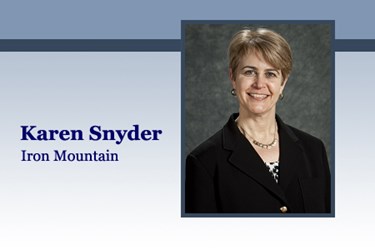Adaptation: The Key To Future HIM Success

By Karen Snyder, Director of Healthcare Consulting, Iron Mountain
It’s a known fact in the animal kingdom that all organisms need to adapt to their habitat to survive. Take the camel, for example. Their long eyelashes, ability to open and close their nostrils, wide feet, fluctuating body temperature, storage of fat (not water) in their humps, plus their sandy color allow them to successfully survive in the harshest of desert conditions.
Given the evolving healthcare landscape, it should come as no surprise that HIM professionals will need to adapt and refine their skill sets if they too want to meet the future challenges of the profession. The seismic shifts that are occurring across the healthcare industry are causing significant disruption to the status quo—but this massive change is also creating significant opportunity for HIM professionals.
Nowhere does this ring more true than in the area of Information Governance. In today’s increasingly complex healthcare landscape, HIM professionals are faced with the task of managing an ever-growing volume and variety of information—distributed across multiple locations. This information has always been critical to deliver effective patient care, but now there is a need to leverage this information to provide new insights, and support strategic initiatives like Population Health and Accountable Care. As traditional tasks like paper records management, transcription and medical record coding decline in value over time, other skills will grow in importance, including managing electronic health records, data analytics, and clinical documentation.
Protecting the privacy and security of patient information and ensuring the integrity and quality of data will continue to be paramount in this new world of Health Information Governance. Leadership, project management and communication skills will be critical qualifications as the industry pivots to a more formalized approach to governance, and HIM takes a more proactive role in IG Steering Committees. In addition, HIM professionals will need to demonstrate proficiency in financial analysis, workflow assessment, change management and innovative problem solving.
Often in the past, HIM professionals were left out of technical discussions and key business decisions. Particularly when it came to Electronic Health Record systems, many Health Information Managers were not consulted and their expertise was frequently overlooked. Unfortunately, HIM was perceived as simply a task-oriented, overhead function, with little to no focus on strategic foresight or innovation.
However, as the future unfolds, HIM professionals should be viewed as collaborative partners with a seat at the table, and an important voice in critical business and technology decisions affecting the quality and integrity of health information. The pivot to a data-driven culture, fueled by transformational initiatives like big data and data analytics, will require health information managers to step outside of their comfort zone. This requires moving beyond their traditional role of managing patient records to one where they extract more value from the information that resides within these records. By delivering real insights, HIM can play a critical role in transforming care delivery to improve the quality of care and health outcomes. And, to be recognized as healthcare industry experts in Information Governance, HIM leaders must be willing and prepared to challenge the status quo, rationalize legacy HIM processes, and most importantly, leverage and share their expertise to shape the vision of governance within their organization.
As the care delivery and regulatory landscape become more complex, HIM professionals must adapt to their surroundings and refine their skills to improve the accuracy, accessibility, delivery and integrity of data, deliver reduced operating costs and exposure to risk, and maximize the value of information across the continuum of care. Those that successfully adapt will be rewarded with high-impact work that contributes to the value of information assets for the good of their healthcare organization and the patients that they serve.
About The Author
Karen Snyder joined Iron Mountain in 2005 and is currently the Director of Healthcare Consulting. As the product line General Manager, she is responsible for the strategy and business plan execution for Iron Mountain’s EMR Enablement suite of services that includes core Records Management, Release of Information and Document Scanning solutions. Karen has been instrumental in launching several new products at Iron Mountain, led the company’s growth in Solutions Marketing and was the recipient of the prestigious President’s Award in 2008. Prior to joining Iron Mountain, Karen spent over 12 years in various marketing, strategy and finance positions at AT&T. She graduated with distinction, earning a dual-MBA in Marketing and International Business from New York University (NYU) and also holds a B.S. degree in Accounting from NYU.
